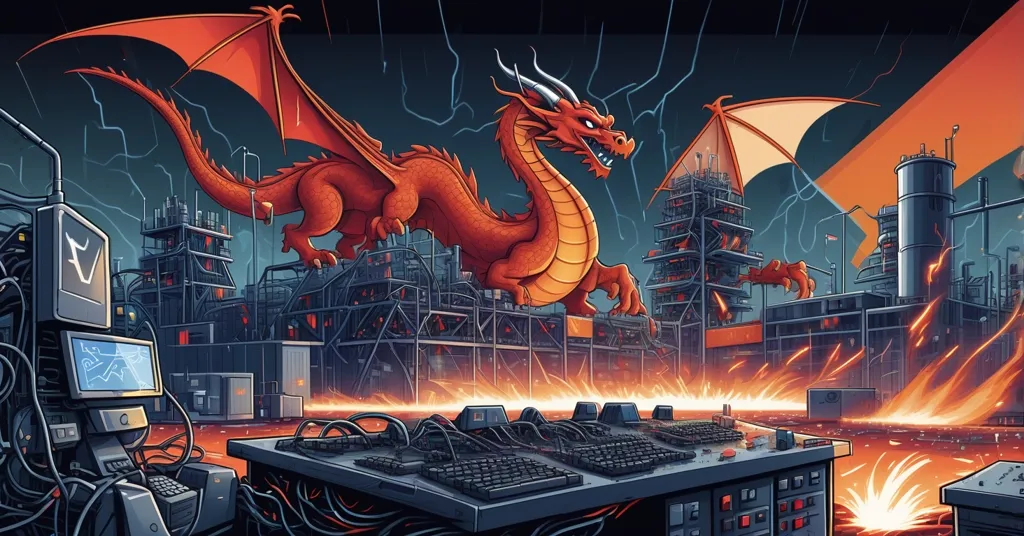Netherlands Seizes Nexperia: Geopolitical Clash Disrupts Crypto Hardware Supply

Netherlands Seizes Nexperia, Unleashing Geopolitical Chaos with Crypto Ripple Effects
The Dutch government has dropped a bombshell by seizing control of Nexperia, a crucial semiconductor supplier for Europe’s automotive industry, from its Chinese parent company Wingtech. Using emergency powers under a dusty Cold War law, this unprecedented move aims to block foreign influence over critical tech but has ignited a fierce clash with Beijing, disrupted global supply chains, and exposed vulnerabilities that could hit even the decentralized world of Bitcoin and blockchain hard.
- Unprecedented Takeover: Netherlands uses the 1952 Goods Availability Act to strip control of Nexperia from Wingtech.
- China’s Fury: Beijing retaliates by blocking a key factory, choking off vital components to Europe and Asia.
- Industry Crisis: Automakers face looming production halts as tensions spiral.
- Crypto Stakes: Semiconductor shortages threaten the hardware backbone of Bitcoin and blockchain networks.
The Stakes: Why Nexperia Is a Big Deal
Nexperia isn’t just some obscure tech outfit. Headquartered in the Netherlands, this semiconductor powerhouse pumps out 3,000 components per second—tiny but mighty pieces like transistors and logic chips that are the beating heart of cars, smartphones, industrial machines, and yes, even the rigs mining Bitcoin or running blockchain nodes. For Europe’s automotive sector, Nexperia is a cornerstone, feeding critical parts to giants like Volkswagen, BMW, and Toyota. Without these chips, assembly lines grind to a halt, and the ripple effects touch nearly every corner of modern life.
So why the drama? Since 2018, Nexperia has been owned by Wingtech, a Chinese firm recently slapped onto U.S. trade restriction lists over suspected state ties. Alarm bells started ringing in Amsterdam by late 2023 when rumors swirled that Wingtech, under executive Zhang Xuezheng, might shift Nexperia’s operations out of Europe, gutting local manufacturing. Worse, Zhang was linked to $130 million in dodgy internal transactions tied to a company he controlled, while also firing three senior Dutch execs at Nexperia. Trust evaporated. On October 7, 2024, the Dutch government invoked the 1952 Goods Availability Act—a Cold War-era statute designed to secure essential resources during national emergencies—to oust Zhang and take the wheel. Vincent Karremans, caretaker overseer of Dutch economic policy, didn’t hold back:
“Zhang was secretly working behind our backs to relocate the company abroad.”
This isn’t a petty corporate squabble. Semiconductors are the new battleground for economic and national security. While Nexperia doesn’t match the sheer scale of Dutch chip titan ASML, its role in Europe’s tech ecosystem is vital. Losing it to foreign control could mean surrendering leverage over innovation and stability at a time when every chip counts.
China’s Retaliation: A Supply Chain Gut Punch
Beijing wasn’t about to let this slide. In a calculated counterstrike, China blocked a factory central to Nexperia’s supply chain, slamming the brakes on component flows between Europe and Asia. This isn’t just a slap on the wrist—it’s a deliberate move to remind the West how much it relies on Chinese manufacturing. China’s Commerce Minister Wang Wentao came out swinging, declaring the Dutch seizure, as reported in recent coverage of the emergency powers used by the Netherlands, had:
“Seriously affected the stability of global supply chains.”
This escalating feud lands at a brutal moment. The global chip shortage, worsened by post-COVID bottlenecks, has already laid bare the fragility of cross-border dependencies. Now, with the U.S. piling on trade pressures under the Trump administration—think tariffs and tightened restrictions on Chinese tech—and Europe pushing for independence via the EU Chips Act, semiconductors are no longer just tech; they’re geopolitical dynamite. Desmond Doran from the University of Kent Business School saw this trainwreck coming:
“The disruption around Nexperia was entirely foreseeable.”
Chip War author Chris Miller echoed the dread, warning that sustained chaos:
“Could have dramatic implications for manufacturing supply chains.”
The Netherlands finds itself at the epicenter of a high-stakes power struggle, with major players like the U.S., China, and the EU all vying for control over the silicon that powers the future.
Automotive Industry on the Brink
The most immediate victims of this standoff are car manufacturers. European and Japanese automakers, already reeling from sluggish demand and sky-high costs, now stare down potential delivery cuts and full-on production shutdowns. Sigrid de Vries, Director General of the European Automobile Manufacturers’ Association (ACEA), laid out the panic:
“The automotive industry suddenly finds itself in this alarming situation. We really need quick and pragmatic solutions from all countries involved.”
Companies like BMW, Volkswagen, and Nissan are reportedly scrambling for backup suppliers, but with global chip inventories still razor-thin, good luck with that. If this deadlock drags on, expect delays in popular models—think your next Audi sedan or Toyota hybrid—or outright factory closures across Germany, France, and beyond. This isn’t a niche problem; it’s a stark illustration of how a single choke point in China can paralyze industries halfway around the world.
The Dutch aren’t sitting idle. Beyond the Nexperia takeover, Vincent Karremans unveiled €200 million for an AI center in Groningen and nearly €500 million to fortify the national tech sector, part of a broader European drive to cut reliance on foreign powers. Talks with Germany under Chancellor Friedrich Merz are underway to cushion the supply chain blow, but with Beijing showing no signs of backing down, quick fixes are a long shot. A Nexperia spokesperson offered a faint hope:
“We hope this matter can be de-escalated soon, in the benefit of all parties involved.”
Let’s be real—when national security and tech collide, de-escalation is often more wishful thinking than reality.
Devil’s Advocate: Did the Netherlands Go Too Far?
Let’s flip the script for a moment. The Dutch government claims it’s safeguarding national interests, but is this heavy-handed move a misstep? Seizing a company from a foreign owner might protect local tech today, but it could scare off other international investors tomorrow, branding Europe as a risky bet for capital. There’s also a whiff of double standards—Western nations leaned on cheap Chinese manufacturing for decades, only to balk when influence flows the other way. This could stoke wider trade wars, dragging smaller economies into the fray and hiking costs for everyone. As champions of decentralization, we get the urge to break up foreign control, but government overreach under the guise of “security” sets a slippery precedent. Could this kind of state intervention one day target the very crypto freedoms we fight for? It’s worth chewing on.
Crypto’s Hidden Vulnerability: Hardware Matters
Think Bitcoin and blockchain are immune to this geopolitical dumpster fire? Think again, hodlers. While we rave about decentralization and flipping the bird at centralized power, the cold truth is that our digital rebellion rides on physical hardware—hardware caught in these supply chain nightmares. Bitcoin miners depend on specialized ASIC chips to solve complex math problems and secure the network. Node operators need robust servers to keep the ledger alive. Even hardware wallets, those little gadgets safeguarding your private keys, rely on semiconductors like the ones Nexperia cranks out.
A shortage or price surge from this crisis could delay gear shipments, inflate costs for miners, or stall network expansion. Imagine trying to scale a mining operation only to find your rigs are stuck in limbo because a factory in China got locked down over a diplomatic spat. Ethereum stakers, altcoin miners, and DeFi degens aren’t safe either—every corner of crypto leans on this silicon foundation. For Bitcoin maximalists like us, it’s a bitter pill: centralization in hardware production, whether in Chinese plants or Dutch factories, undercuts the borderless ethos we preach. If a petty government feud can disrupt the chips powering our decentralized future, we’ve got a gaping hole in our armor.
This ties straight to our mission of disrupting the status quo. True decentralization isn’t just about code or consensus mechanisms—it’s about securing the entire stack, from software to circuits. The Nexperia mess is a loud wake-up call. We need to push for solutions like open-source chip designs or community-driven manufacturing to break free from these choke points. Because if the silicon dries up, so does our shot at a freer financial system.
Looking Forward: A Messy Path to Tech Sovereignty
The Nexperia fiasco isn’t just a spat between the Netherlands and China—it’s a snapshot of a global tug-of-war over who controls the tech that shapes tomorrow. The West’s drive to loosen China’s stranglehold on critical industries vibes with our love for decentralization: smashing monopolies and overbearing control wherever they lurk. But let’s not sugarcoat the cost. Every trade jab, every factory shutdown, jeopardizes the systems we depend on—from car production to crypto mining.
Don’t expect a tidy resolution. The Dutch are digging in, China’s pushing back, and more government meddling is likely on the horizon. Retaliatory strikes and supply chain headaches will keep piling up, with industries and innovators caught in the crossfire. For the crypto crowd, this is both a challenge and a call to arms. We can’t just cheer for Bitcoin’s borderless magic while ignoring the physical chains holding it back. Securing resilient, decentralized hardware isn’t a luxury—it’s a necessity. The path to upending the old guard just got a hell of a lot thornier, but damn if it isn’t worth the fight.
Key Questions and Takeaways
- What sparked the Dutch takeover of Nexperia?
Fears of Chinese influence through Wingtech and executive Zhang Xuezheng’s suspected plans to relocate operations abroad drove the Netherlands to act, prioritizing Europe’s tech and manufacturing security. - How is China hitting back at the seizure?
Beijing retaliated by shutting down a critical factory in Nexperia’s supply chain, disrupting component flows and ramping up geopolitical friction with Europe. - What’s the damage to the automotive sector?
European and Japanese carmakers like BMW and Toyota face production delays and potential factory shutdowns, worsening existing economic struggles. - Why are semiconductors so crucial globally?
With output like Nexperia’s 3,000 components per second, semiconductors underpin vehicles, electronics, and industrial systems, making them the lifeblood of modern economies. - How does this affect Bitcoin and blockchain?
Supply chain snags threaten the availability and cost of essential hardware—ASIC miners, servers, wallets—risking delays and higher barriers for decentralized network growth. - Could the Dutch action backfire?
While protecting national interests, the takeover might deter foreign investment and fuel broader trade conflicts, potentially harming Europe’s tech ambitions and setting risky precedents for state overreach.



